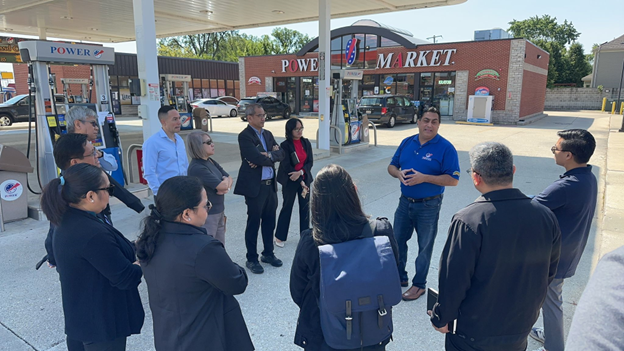In June, the Philippines began allowing fuel retailers to blend gasoline with up to 20 percent ethanol (E20), making its biofuel policy one of the most progressive in the world. To strengthen ties between the U.S. ethanol industry and the Philippines in anticipation of increased demand, the U.S. Grains Council (USGC) and Illinois Corn escorted a group of Filipino government officials to inspect and study the U.S. ethanol value chain and see its quality firsthand.
“The Philippines’ discretionary E20 blend rate is a massive step forward that will benefit consumers at the pump and contribute to a cleaner, healthier environment in the country and I hope it serves as an example for many other countries to follow,” said Caleb Wurth, USGC Regional Director for Southeast Asia and Oceania (SEA&O). “This program will continue to foster a positive relationship between the Philippines’ transportation sector and U.S. ethanol producers that can meet this new demand.”
Wurth was joined in Illinois by USGC Deputy Regional Director for SEA&O Chris Markey, USGC Consultant Kent Yeo and 11 representatives from the Philippines National Biofuels Board to begin an agenda filled with high-level meetings and tours of farms, ethanol plants and retail fuel stations. The National Biofuels Board provides policy recommendations for biofuel usage, including the decision to allow blending up to E20 levels. This is in addition to the country’s nationwide E10 mandate that was implemented in 2013.
Proceedings kicked off with an overview of U.S. corn’s quality and sustainability benefits at the University of Illinois Urbana-Champaign’s bioprocessing research laboratory.
The group also visited Illinois Corn’s headquarters to learn about the organization and met with representatives from the American Lung Association for details on the human health benefits of higher ethanol blending rates in gasoline.
“The delegation members were all very engaged, which only adds to the excitement over the future prospects of the Philippines ethanol sector. I’m confident that this mission will lead to big things in the future for our partnership with the Philippines,” said Collin Watters, director of exports & logistics at the Illinois Corn Marketing Board.
The next day, participants met with lllinois Corn Growers Association Director Chris Gould, at his family farm in Maple Park, IL. There, the delegation was able to see on-farm practices that U.S. corn farmers utilize to ensure yield and sustainability improvements. The delegation also had the opportunity to tour the facility of a leading ethanol producer to learn more about the innovative technologies, production processes and products the company is employing to increasingly decarbonize production and boost octane and nutrition supply.
Participants rounded out the week by spending time at the University of Illinois Chicago’s Energy Resources Center for a series of presentations diving in-depth into the carbon emission reduction capabilities of biofuels, the octane levels of gasoline blended with ethanol and vehicle compatibility with mid and high-level blends of ethanol fuel.
“The knowledge gained and relationships built on this mission will help underpin the Philippines’ drive towards the commercial implementation of E20 availability and, ultimately, an expansion of a nationwide ethanol mandate which is proven to increase consumer welfare and significantly mitigate on-road GHG emissions,” Wurth added. “I extend my thanks to Illinois Corn and the University of Illinois for their work this week in raising participants’ awareness of U.S. ethanol’s climate-friendly attributes and further opening avenues for U.S. -Philippine climate cooperation.”
The Philippines has long been a key customer of U.S. ethanol since the former instituted an E5 mandate in 2009, which galvanized both its local production and demand for imported U.S. ethanol. Roughly 55 million gallons of ethanol was imported from the U.S. in 2023, accounting for 85 percent of all ethanol imports and 40 percent of the Philippines’ total ethanol demand. This mutually beneficial trade relationship forged through ethanol helps stimulate further investment in the Philippines domestic ethanol industry, as U.S. ethanol imports help lower the average price of ethanol and gasoline in the country.
A nationwide E20 mandate would bring the total ethanol demand in the Philippines to 360 million gallons per annum.
Learn more about the Council’s work in the Philippines here.
About The U.S. Grains Council
The U.S. Grains Council develops export markets for U.S. barley, corn, sorghum and related products including distiller’s dried grains with solubles (DDGS) and ethanol. With full-time presence in 28 locations, the Council operates programs in more than 50 countries and the European Union. The Council believes exports are vital to global economic development and to U.S. agriculture’s profitability. Detailed information about the Council and its programs is online at www.grains.org.

